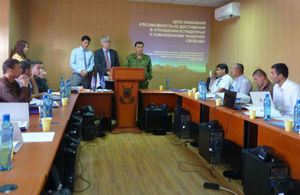Prison Guards to be Trained How to Treat Persons Sentenced to Life Imprisonment
Prison guards in Tajikistan will learn how to appropriately treat life sentenced prisoners in a training workshop drawing on international best practice.

Mark Woodham giving opening speech during seminar
The training, to be held on 16-17 September, will aim to increase the knowledge of prison staff about international standards related to persons sentenced to the death penalty or life/long-term imprisonment. International experts from the UK and Ukraine and employees of the Prison Service (GUIN) of the Ministry of Justice of the Republic of Tajikistan will take part in the event.
‘Unfortunately, there is currently no special training for prison officials on how to treat persons sentenced to life or long-term imprisonment’, said Saule Mektepbayeva, Regional Director of Penal Reform International in Central Asia. ‘Working with this group of prisoners requires particular skills, especially knowledge of international human rights standards. Taking into account the remoteness of the prison, the segregated detention of prisoners and the nature of the offences committed by these prisoners, continuous training of prison guards is the only thing that can guarantee respect for prisoners` human rights and the normal functioning of the prison facility.’
Currently, more than 60 people are serving life sentences in Tajikistan. Life imprisonment can be applied for the most severe crimes, as well as being an alternative to the death penalty. Unfortunately, a person facing a life sentence issued by the court of justice in Tajikistan cannot be released on parole. A Life sentence without any hope of ever being released is in fact a form of capital punishment. The increase in the number of people serving life or long term sentences, impacts the prison system. Parole cannot be used as incentive for prisoners with nothing to lose who make prisons less safe and make the work of prison managers and their coworkers more complicated. This is also one of the primary causes of overcrowding in prisons, which on its own poses serious problems for prison systems around the world.
The training is being carried out as part of Penal Reform International’s EU-funded, two-year global project on ‘Progressive abolition of the death penalty and the implementation of humane alternative sanctions after a moratorium or abolition’. The European Union has allocated EUR 161 370 for the implementation of this project in Central Asia.